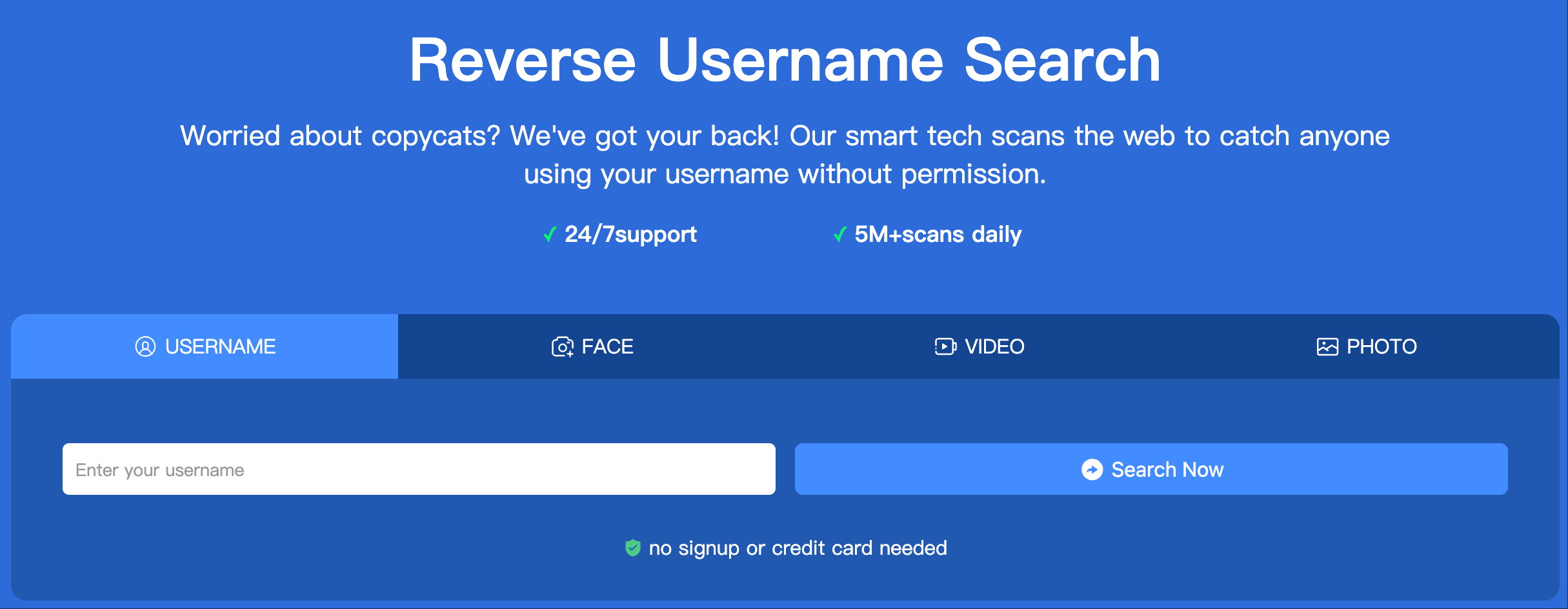Confrontare i prezzi, i tassi di successo e la velocità di Erasa, le regole, l’applicazione e altro per proteggere i contenuti divulgati solo dai fan. Liberi modelli e suggerimenti per insider.
Reverse Username Search 2025: Proteggi il tuo nome utente
Indice
Nell’epoca delle identità digitali, un singolo nome utente può collegare la tua presenza su dozzine di piattaforme. Dai social network e-commerce alle piattaforme per creator e ai forum di discussione, i nomi utente rappresentano il filo conduttore della tua identità online. Ma questa comodità ha anche un costo nascosto.
Quando il tuo nome utente diventa riconoscibile o facilmente ricercabile, può trasformarsi in un bersaglio per imitatori, scraper di dati e persino truffatori. Per questo motivo, comprendere il valore e la vulnerabilità dei nomi utente è essenziale, soprattutto per chi crea, pubblica o promuove contenuti online.
Perché i nomi utente sono importanti per la sicurezza online e la protezione del brand
Nel mondo iper-connesso di oggi, il tuo nome utente è più di una semplice credenziale di accesso: è la tua impronta digitale.
La maggior parte degli utenti tende a riutilizzare lo stesso o simili nomi utente su più piattaforme come Instagram, TikTok, Reddit, Twitter/X e forum di gaming. Se da un lato questo rende più semplice mantenere un’identità coerente, dall’altro aumenta i rischi: se uno dei tuoi handle viene compromesso o imitato, gli attori malevoli possono utilizzare le tecniche di ricerca inversa del nome utente per tracciare la tua presenza altrove.
Per i creator, gli influencer e gli imprenditori digitali, questo può comportare:
- Attacchi di impersonificazione che ingannano il tuo pubblico o danneggiano la tua reputazione
- Scraping o leakage di contenuti, con la ripubblicazione non autorizzata di materiale privato o a pagamento
- Account falsi di supporto, usati per truffare i tuoi follower
- Confusione del brand, se qualcun altro registra un handle simile su nuove piattaforme
Inoltre, i nomi utente vengono spesso indicizzati dai motori di ricerca pubblici, rendendo facile per i malintenzionati trovare tracce della tua attività, anche di anni passati. Ecco perché il monitoraggio proattivo dei tuoi username è un passo cruciale per la protezione dell’identità digitale e dei contenuti.Cos’è la Reverse Username Search?
La ricerca inversa del nome utente (Reverse Username Search) è una tecnica che consente di tracciare attività online o identificare identità digitali partendo da un singolo nome utente. A differenza delle ricerche tradizionali basate su nomi reali, email o numeri di telefono, questo metodo inizia da un handle — ad esempio @john_doe_88 — e individua dove altro quel nome utente (o simile) compare in rete.

Questa metodologia viene comunemente usata per:
- Localizzare profili social (Instagram, Twitter/X, TikTok, Reddit)
- Identificare forum, marketplace o siti di dating in cui un utente è attivo
- Rilevare pattern usati da imitatori o scammer
- Collegare account multipli riconducibili alla stessa persona
Molti utenti riutilizzano i propri username su più piattaforme, senza rendersi conto di quanto ciò li renda tracciabili. Gli strumenti di ricerca inversa aggregano dati da profili pubblici, metadati di immagini e altre fonti OSINT (Open Source Intelligence) per fornire risultati. Alcuni strumenti avanzati evidenziano persino username simili, typosquat o varianti di brand.
Per creator e aziende, questo processo può rivelare repost non autorizzati, account falsi o fan page oltre il limite. È anche uno strumento chiave nelle indagini sui takedown e nelle azioni legali.
Principali casi d’uso della Reverse Username Search

La ricerca inversa del nome utente non è solo un trucco di cybersecurity, ma un strumento pratico con applicazioni reali per la protezione dei contenuti, il monitoraggio del brand e la verifica delle identità.
1. Individuare impersonificazioni sui social
Gli account falsi sono in aumento, soprattutto contro creator, influencer e piccoli brand. Se qualcuno crea un profilo fake usando il tuo nome (o uno simile), può ingannare i tuoi follower e danneggiare il tuo brand. Una Reverse Username Search ti permette di scoprire questi duplicati su Instagram, TikTok o X, così da intervenire subito.
2. Tracciare contenuti rubati o ripubblicati
Se i tuoi video o foto premium vengono diffusi senza permesso, spesso l’unica traccia è l’username del leaker. Una ricerca inversa può rivelare dove quell’utente è attivo e come distribuisce i tuoi contenuti, in particolare su forum, canali Telegram o fanpage non autorizzate.
3. Monitorare l’abuso di nomi di brand o creator
Sia brand che creator affrontano il rischio che altri registrino nomi simili su nuove piattaforme. Un competitor potrebbe registrare il tuo nome con suffissi come “.ai” o “.tv”. La ricerca inversa aiuta a monitorare dove il tuo handle appare, prevenendo confusione e perdite di entrate.
4. Verificare identità prima di collaborazioni
Prima di firmare accordi con un creator o concedere licenze, una Reverse Username Search aiuta a verificare identità e reputazione, controllando cronologia account e footprint sociale.
5. Supporto in indagini e azioni legali
Per team di copyright o reputation management, la ricerca inversa è parte della toolkit OSINT: supporta la raccolta di prove, la preparazione di richieste di rimozione e l’identificazione degli utenti durante le indagini.
Guida passo-passo: come eseguire una Reverse Username Search
1. Raccogli il nome utente da analizzare (@brand_support, @johnny88 ecc.).
2. Vai allo strumento di Erasa per la Reverse Username Search, cloud-based e senza installazione.
3. Inserisci il nome e avvia la scansione: Erasa interroga social, forum, marketplace, directory.
4. Analizza i risultati: corrispondenze, near-match, piattaforme sospette, forum legati a pirateria o adult.
5. Agisci: invia takedown via Erasa, attiva monitoraggio continuo, whitelist per handle sicuri.
I migliori strumenti di Reverse Username Search 2025
- Erasa Reverse Username Search – Creato per la protezione dei contenuti, rileva impersonificazione, brand abuse e leaks.
- Social Catfish – Ottimo per verificare identità e profili di dating.
- InfoTracer – Background check approfonditi con dati legali.
- Namechk – Verifica se un nome utente è disponibile su centinaia di piattaforme.

Linee guida legali ed etiche
- ✅ Legalità: consentita se i dati sono pubblici (OSINT).
- ❌ Non consentito: doxxing, raccolta di contenuti privati, uso non consensuale.
- ⚖️ Etica: usala per proteggere, non per invadere. Scopi legittimi: prevenire truffe, difendere contenuti, monitorare brand.
Conclusione: la visibilità è protezione
Il tuo nome utente è più di un handle: è la tua firma pubblica, il tuo brand, e la tua potenziale debolezza se non viene monitorato.
- ✅ Identifica minacce in anticipo
- ✅ Fai valere i tuoi diritti prima che il danno cresca
- ✅ Proteggi la tua identità su più piattaforme
👉 Pianifica scansioni mensili con Erasa
👉 Attiva monitoraggio continuo per handle a rischio
👉 Educa il tuo team a comportamenti brand-safe
👉 Documenta prove e richieste di takedown
In un mondo in cui le piattaforme cambiano rapidamente ma i tuoi username ti seguono ovunque, la visibilità diventa protezione.
Riprendi il controllo — un nome utente alla volta.
Imparate a proteggere i vostri contenuti orientati agli adulti su X (Twitter) con gli strumenti DMCA razionalizzati di ERASA. Guida passo per passo + modello gratuito.
Imparate come rimuovere foto e video di sole fan trapelate da siti web, risultati di ricerca e piattaforme sociali - usando DMCA comprovato - fate dei passi che funzionano davvero.
Preoccupati per i catfishing o le identità false nelle app per appuntamenti? Usa tecniche di ricerca fotografica e facciale per individuare l’impersonazione prima che si trasformi in una truffa.
Controlla dove le tue foto appaiono online usando la ricerca a ritroso. Rilevare immagini reimpostate o rubate su siti web pubblici e piattaforme sociali.
Cercare una persona per foto? Imparate come funzionano le ricerche basate su foto, come identificare qualcuno in un’immagine, e rilevare il riutilizzo di foto catfish.
